Fenrir Interview
Interview with Elsa Thouvenot of Fenrir
April 5, 2013 in Paris
Introduction: I discovered French folk metal band Fenrir last year when they opened for Tristania in Paris. I loved their Celtic costumes and themes, energetic violin-infused guitars, and vocals -- and immediately became a fan. I bought their 2012 debut album, Echoes of the Wolf, and have seen them twice more live in Paris. Recently, I had the chance to interview their lead singer, Elsa Thouvenot. We discussed Vikings and Celts, women in metal, and more.
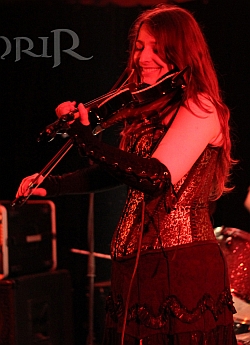
John: Thanks again for agreeing to do this interview. Sonic Cathedral has covered your album and demo, and I covered one of your concerts, but I think this is our first interview. I saw another of your interviews on another site.
Elsa: Yes, it’s my first interview for Sonic Cathedral, but we’ve already done one for FrenchMetal website for instance.
John: Let’s start with Echoes of the Wolf. It has been out about a year, can you say what was your goal for the album?
Elsa: We wanted to express our music in a complete album, not only with 6 or 7 songs. We had been waiting for that for very long; that’s why the album is quite long!
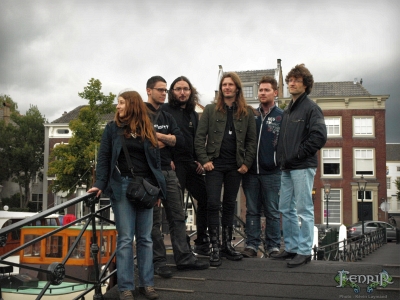
John: Over how many years did you develop the songs for Echoes?
Elsa: In fact some of the songs are from the first we played, in 2006! It’s the case of Thunder-cliff and Lost in the Twilight. We had already recorded them in our first demo.
John: Right, I’ve heard that too. Can you say what the original vision for the band was? Was it you mostly you and Sylvère Jandel’s plan?
Elsa: In fact Sylvère created the band in 2006 and I entered the band only in 2007. So he should answer this question! I think at the beginning Fenrir’s music was less heavy, but every member in the band brought something new, and we like a lot what our sound has become.
John: I like it too. How would you describe what that sound is for someone who has not heard it?
Elsa: It’s a mix of classic heavy metal (mainly the guitars parts), folk tunes with violin and female voice.
John: Can you say what attracted you to join back in 2007?
Elsa: In fact, at that time I was Sylvère’s girlfriend and they had troubles with their first singer so I proposed to enter the band.
John: Ah! Well it’s cool the band survived even though you’re not a couple anymore, unlike some bands. I’ve always thought Mark and Simone were very mature since Epica survived that too. But artistically, can you say what attracted you about the sound and theme?
Elsa: At that time I didn’t know metal very well. But I liked Celtic music a lot, for example the French band from Brittany Tri-Yan. And I liked the energy of Sylvère’s music. And I was looking for something new to sing.
John: Interesting. So you became a metal singer without being a metalhead first! Would you say you have become one now?
Elsa: In 2007 I only knew a little Nightwish, Within Temptation and Rhapsody. But now I’ve discovered a lot of bands and I think I’m a real metalhead yes!
John: Watching you perform, I think you are too. You seem so happy on stage. Can you put into words what feelings you have when you hear the music (a hard question, I know)?
Elsa: Yeah it’s hard to express! I think I try to identify with music, to mix my inner feelings with it. To live the music.
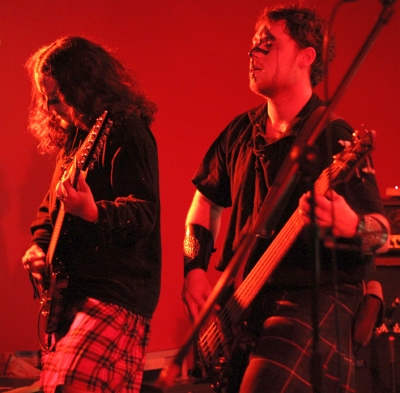
John: Yes, I know it’s hard for me too to put into words. I feel excitement and happiness, but the aggressive sound of metal is also a release for me.
I’ve been happy to see that more and more women are getting involved in metal. Since it has been traditionally male dominated, and focuses a lot on male emotions I think, I’ve been curious what women feel. Do you have any comments on the growing role of women in metal -- why it’s happening, how it’s changing the scene, etc.?
Elsa: I’m not sure I understand why it’s happening, but it changes the vision of metal from the outside: maybe more people will discover metal this way. But I also have the feeling there is less diversity in bands since fewer male-fronted bands are developing nowadays. I hope there will be a new balance soon.
John: I see your point. At least from my perspective, it does seem like a lot of the excitement and innovation is in female fronted metal. Who will be the new Iron Maiden (though I love the male singers in Kamelot and Serenity)?
Do you find it challenging being a woman in metal? Or do you find yourself well accepted now, so it’s no big deal?
Elsa: It can be hard sometimes being the only woman in a band (smiles)! But I feel well accepted in the band, and with other bands too, so there is no problem. The only issue is that female-fronted metal conveys a lot of clichés, and some metalheads don’t think our music is serious.
John: Yes, I still see comments like that too, for example on Blabbermouth. How do you try to avoid the clichés in Fenrir?
Elsa: Perhaps we can avoid those because we don’t play gothic or symphonic metal. Heavy or folk metal seems more original for a female-fronted band.
John: Yes, folk metal does seem new to a lot of my friends. But it seems pretty popular here in France. Do you agree? Do you know what has caused that?
Elsa: Maybe it is because of a renewal of regional traditions in France: there is a new interest for regional languages for instance. In France, Celtic music comes mainly from Brittany, in the West, where Celts moved when Britain was invaded at the beginning of the Middle Ages. But Celtic music is becoming more and more popular in the whole of France. Perhaps you can see that with the development of the celebration of St. Patrick’s Day in France, even if it is above all an opportunity to drink beer.
John: Yes! Well, beer is a folk tradition too, I think! This leads me to another question. You have degrees in both music and history, right?
Elsa: Yes, at university I studied history and history of art. I studied music in a “Conservatoire,” which is a French regional music school.
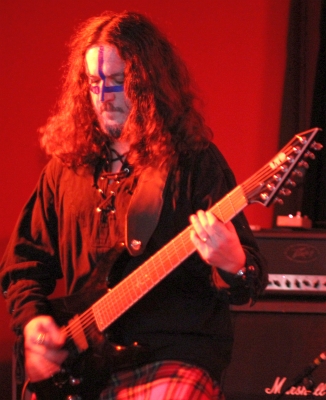
John: Does this background affect Fenrir’s lyrics? Or does Sylvère write those? I’m not sure whether “composed” in the liner notes includes lyrics.
Elsa: Yes, Sylvère also writes most lyrics. But he also studied history of the Middle Ages, so we have references in common.
John: Who do you prefer, Celts or Vikings? I ask because they were historic enemies, yet Fenrir seems to celebrate both.
Elsa: Fenrir evokes both, because our interest is in history and mythology of those times. We do not want to embody only one people, against the others. So there isn’t one I prefer.
John: Makes sense. Do you know the Scottish pirate band Alestorm? I saw them a few weeks ago in Paris, and they asked the audience, how many of you are Vikings? They got a lot of cheers. Then they said, “Well, we don’t like Vikings. This is a song about killing Vikings!” But I like both too.
Elsa: I know them only a little. But it’s true some people don’t understand why we talk about Vikings, since we are not from Scandinavia. In fact France also has a Viking history: some of them settled in Normandy, in the West. However, for our next album, I only can tell you that we’ll talk less about Vikings and more about Celts from Britain.
John: Interesting. You almost need to put some history in your liner notes. Are you able to give an estimate yet on when that next album will be out?
Elsa: It’s difficult to say, because we have just changed guitarist and have to work with him all new and old songs. But we hope to be able to record in less than a year.
John: I hope so too. I’ve probably taken enough of your time today. Is there anything else you’d like to tell our readers?
Elsa: It’s a pleasure to be discovered by new people and we hope we’ll come one day to play in the US!
John: That would be really cool! Thank you very much for the interview!
Elsa: You’re welcome!
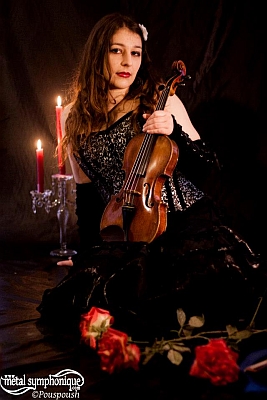
(Elsa portrait by Pouspoush of MetalSymphonique.com, group photo by Kévin Laymand, live photos by John Thornburgh)
